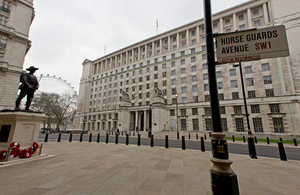Sixth Meeting of the U.S.-UK Trade and Investment Working Group
On July 8, Secretary of State for International Trade Dr. Liam Fox MP and United States Trade Representative Robert Lighthizer met in Washington, DC and discussed the ongoing work of the U.S.-UK Trade and Investment Working Group.
On July 10-11, the UK and United States held the sixth meeting of the U.S.-UK Trade and Investment Working Group in London, which focused on strengthening our trade and investment relationship; laying the groundwork for a potential future trade agreement once the UK leaves the EU; and cooperating on global issues.
Since the Working Group last met in November 2018, USTR published its negotiating objectives for a trade agreement with the UK. At the Working Group, the UK restated its commitment to publishing its own negotiating objectives, scoping assessment and response to the public consultation before negotiations begin.
The Working Group discussed the progress made in recent months to ensure continuity of trade between our two countries as the UK leaves the EU, notably the signature of Agreements on Mutual Recognition, Marine Equipment, Wine and Distilled Spirits. In addition, both sides signed a bilateral agreement regarding insurance and reinsurance in December 2018.
The Working Group’s discussions covered a range of trade topics including services; financial services; procurement; agriculture; sustainability/labor, environment; trade remedies; industrial subsidies; intellectual property; anti-corruption and Small and Medium-sized Enterprises (SME).
In addition to the Working Group, the UK and the United States held the fourth meeting of the U.S.-UK SME Dialogue in Bristol on July 9. The discussion focused on opportunities presented by emerging technologies for services and digital trade; the obstacles SMEs currently face in trading between the UK and U.S.; and how these obstacles can be reduced, including through a potential future trade agreement. With more than 80 stakeholders in attendance, SMEs participated in a best practice exchange on doing business in the U.S. and the UK in the areas of artificial intelligence, virtual reality and mobile applications. This meeting followed the first sectoral-focused dialogue for marine technology SMEs in Southampton, UK in April 2019 and the participation of the UK in the May 11 Americas Competiveness Exchange (ACE).
Both sides agreed to hold the fifth SME Dialogue in the United States in early 2020. The U.S. and UK also agreed to explore a second SME best practices exchange in marine technology towards the end of 2019. Lastly, an invitation was extended to the UK for the 13th ACE forum for 2020.
Background
The Working Group was established in July 2017 by UK Secretary of State for International Trade Dr Liam Fox MP and United States Trade Representative (USTR) Robert Lighthizer. Since its inception, the Working Group has been laying the groundwork for an ambitious and wide-ranging potential future free trade agreement once the UK has left the EU, as well as ensuring commercial continuity for UK and US businesses, workers, and consumers. The Working Group delegations were led by officials from the UK Department for International Trade (DIT) and USTR. It also included representatives from a wide range of UK and U.S. Government departments and agencies. Total trade between the two countries is already worth about £190 billion a year. We are each other’s largest source of foreign direct investment and, according to U.S. statistics, the UK and U.S. have around $1 trillion invested in each other’s economies. Every day around one million Americans go to work for UK firms, while around one million Britons go to work for American firms.

